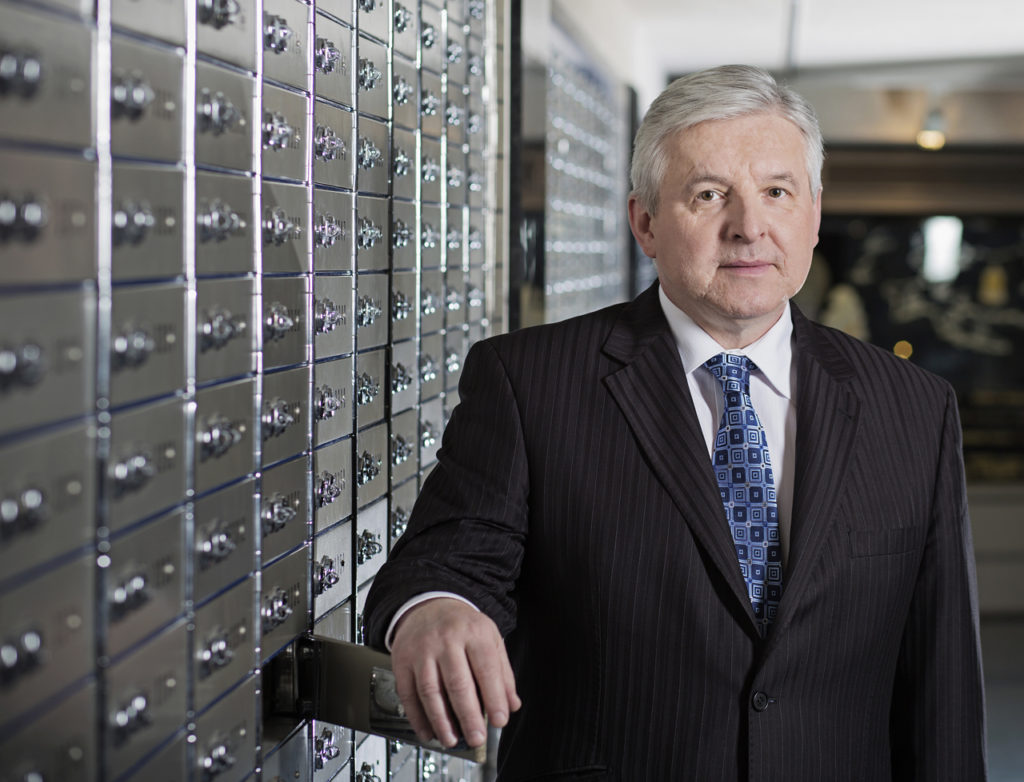“Success hinges on our ability to address the market.”

Mr. Jiří Rusnok (55) was appointed the new Governor of the Czech National Bank for a term of six years starting on 1 July 2016.
“I am greatly honoured to be able to stand at the helm of this unique and internationally acclaimed institution. My colleagues and I will do all we can to ensure that all the tasks conferred on us by law, particularly in the areas of price and financial stability and financial market supervision, continue to be performed with the utmost expertise and care and to the benefit of the Czech economy,” said Mr. Rusnok.
Mr. Rusnok serves as the fourth governor of the CNB since its establishment in 1993. His predecessors were Josef Tošovský, Zdeněk Tůma and, most recently, Miroslav Singer, whose current mandate expired in June 2016 and could not be extended.
Mr. Rusnok has been a member of the Bank Board, the supreme governing body of the CNB, since March 2014. He decided to step down prematurely due to the requirements arising from European law, which stipulates that a governor of a national central bank is appointed for a term of office of at least five years.
Mr. Rusnok is an experienced Czech politician and economist.
In the 1990s, he worked as director of a department of the Czech-Moravian Confederation of Trade Unions. His political positions included Minister of Finance from 2001 until 2002 and Minister of Industry and Trade from 2002 until 2003. Among his professional appointments were President of the Association of Pension Funds in 2005–2012 and President of the Audit Public Oversight Council. In 2010–2013, he was a member of the government’s National Economic Council (NERV). From July 2013 until January 2014, he served as Prime Minister of the caretaker government.
Mr. Rusnok, your appointment has raised high expectations both among supporters of adoption of the single currency and among those who disagree with the policy of currency intervention and weakening the Czech crown in order to support Czech export trade. What is your vision with regard to the activities of the Czech National Bank? And to what extent has this vision been influenced by the recent Brexit referendum vote in the United Kingdom?
My role as Governor of the Czech National Bank does not translate into being a supporter of any particular interest group either in society as a whole or in the economy. My task is to govern the central bank together with the other members of the Bank Board in order to fulfil its role in accordance with the law, that is to maintain price stability, supervise the financial system and support its balanced development, and ensure smooth circulation of money and smooth payments.
Which tools we use to attain these goals always depends on the specific circumstances and conditions in the economy. Given this context, Brexit is only one of the circumstances, or uncertainties if you wish, that our decision-making must take into consideration.
Your communication skills have often been mentioned as a big advantage in comparison to your predecessors. The fact that already during your second week in office you organised an informal breakfast for journalists, supports this contention. How are you going to use this strong skill? And what is your notion of leadership and what other leadership qualities do you consider important?
I do not like to judge myself. I leave that to others. As you mentioned, communication is truly essential, even for the central bank. Our success hinges on our ability to address the markets – in terms of both experts but also the wider public – and to explain why we take certain steps. Only in this manner can we fulfil the mandate given to us by law.
Your experience is vast and diverse. It comprises not only high political functions, but also leading positions in professional associations. Despite the fact that the position of central bank governor is not political, many commentators consider your political experience to be your advantage. On the other hand, you seemed not to miss top politics, as you made remarks about the “unprecedented pressure” you faced when you were Prime Minister. Is there anything you miss about top politics?
I definitely see myself as being practically oriented, so expert and management roles are the ones that come most naturally. The position of governor is somewhere in between a pure expert position and politics. I therefore hope that I will be able to successfully make use of my experience combined with my skills.
With regard to the decision not to adopt the single currency any time soon, which central banks might serve as an inspiration and which ones might be useful for closer co-operation with regard to the EU’s banking union project?
Formally speaking, the Czech Republic is still obliged to adopt the single European currency. However, we have the possibility to decide when we will do so. The Czech National Bank is part of the European System of Central Banks of the EU28 countries. We have very close ties with other central banks all over the world. The Czech National Bank belongs to the group of ten central banks that established and then successfully implemented inflation targeting. Our technical know-how in this area is highly valued and we are one of the top players in this area.
It seems that you are quite successful in protecting your private life. What are your hobbies and what is your approach to work-life balance?
I try to live a normal life. It gives me the necessary freedom and inner balance. I strictly separate my private life from my work. I relax in the great outdoors. I like gardening and sometimes even doing some sports.
As a supporter of diversity, I cannot refrain from asking why there are no women represented in the current Bank Board. Do you see it as an issue?
Right now, there are no women represent- ed, but this has been the case for most of the modern history of the Bank. We will see next time, during the next round of rotation. Then the situation might change. Last but not least, the Bank Board members are nominated by the President of the Czech Republic. It does not fall within my competence.
What are your final words for Czech and Slovak Leaders readers?
I send my regards to the readers, I wish them all the best and I assure them that they do not have to be concerned about their savings and about the stability of the Czech currency.
By Linda Štucbartová
About the Czech National Bank
The CNB is the central bank of the Czech Republic, the supervisor of the Czech financial market and the Czech resolution authority. It is established under the Constitution of the Czech Republic and carries out its activities in compliance with Act No. 6/1993 Coll., on the Czech National Bank, as amended and other regulations. It is a legal entity under public law having its registered address in Prague. It has seven regional offices in Prague, Ústí nad Labem, Plzeň, České Budějovice, Hradec Králové, Brno and Ostrava. It manages its assets, including international reserves, with due diligence. Interventions in its activities are only permissible on the basis of law. The CNB is a part of the European System of Central Banks and contributes to the fulfilment of its objectives and tasks. It is also a part of the European System of Financial Supervision and cooperates with the European Systemic Risk Board and with European Supervisory Authorities.
The supreme governing body of the CNB is the Bank Board, consisting of the CNB Governor, two Vice-Governors and four other Bank Board members. All Bank Board members are appointed by the President of the Czech Republic for a maximum of two six-year terms.

Current members of the CNB Bank Board
- CNB Governor: Jiří Rusnok
- CNB Vice-Governor: Mojmír Hampl
- CNB Vice-Governor: Vladimír Tomšík
- CNB Board member: Vojtěch Benda
- CNB Board member: Lubomír Lízal
- CNB Board member: Tomáš Nidetzký
- CNB Board member: Pavel Řežábek

